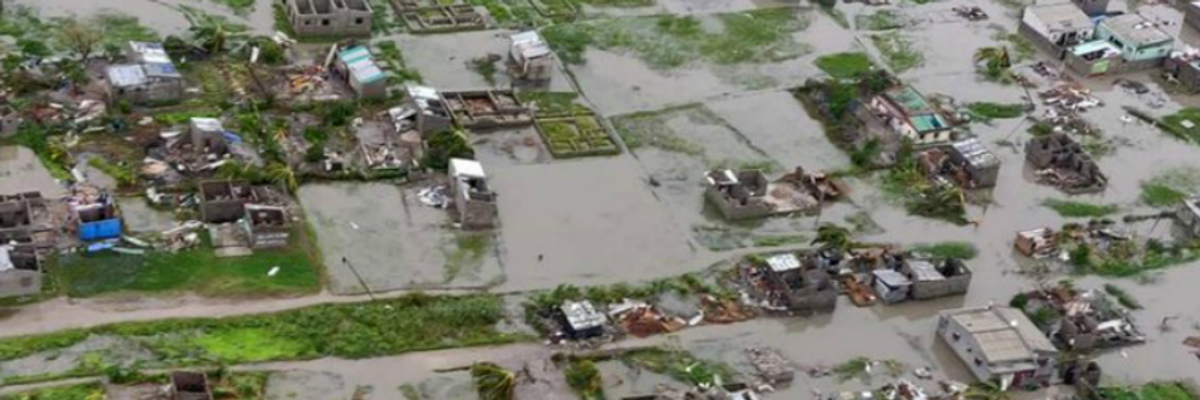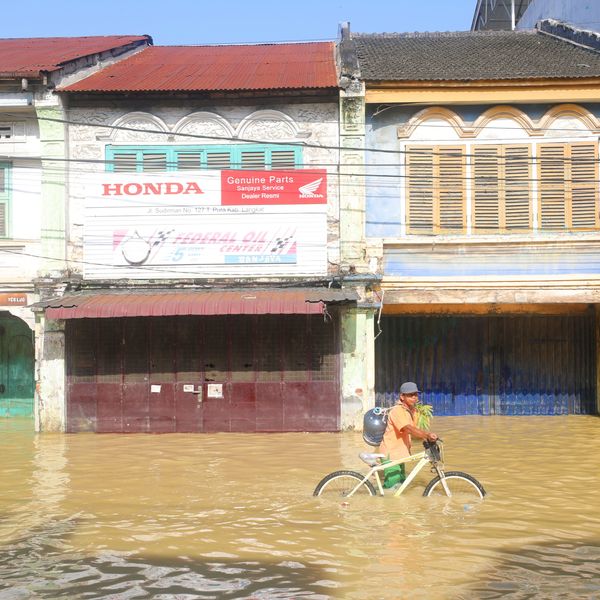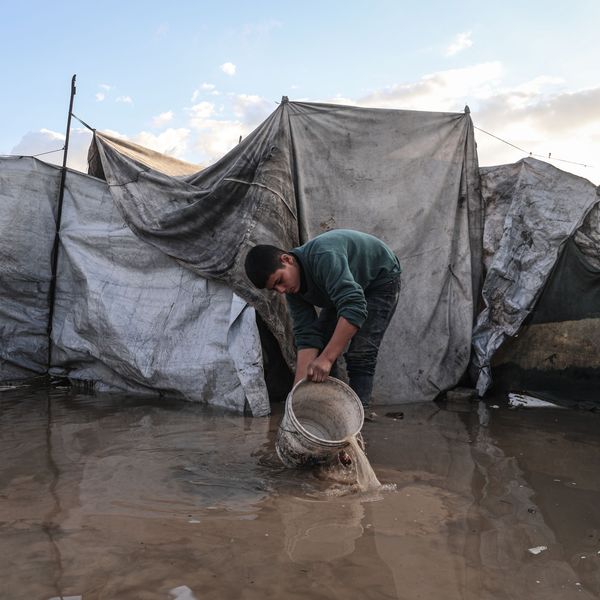
The International Federation of Red Cross and Red Crescent Societies found that 90 percent of Beira, Mozambique was destroyed by Tropical Cyclone Idai after experiencing a direct hit last Thursday. (Caroline Haga/IFRC)
'Everything Is Destroyed': 90% of Mozambique Port City Wrecked by Tropical Cyclone Idai
"The people who've done the least to change the climate suffer the most."
Hundreds of people were killed and many more remain missing after a tropical cyclone destroyed 90 percent of the port city of Beira, Mozambique, before moving on to Malawi and Zimbabwe--eliciting fresh demands for bolder efforts to battle the climate crisis that is making extreme weather more common and devastating.
An initial assessment from the International Federation of Red Cross and Red Crescent Societies (IFRC) on Monday found that 90 percent of the city and the surrounding area "is completely destroyed" after experiencing a direct hit from Cyclone Idai last Thursday.
\u201c~36 hours after the landfall of Cyclone #Idai \u2014 what the @WMO called a "potential worst case scenario\u201d \u2014 these are some of the first photos of Beira, Mozambique, a city that is still largely cut off from the rest of the world by flooding.\n\nA growing humanitarian catastrophe.\u201d— Eric Holthaus (@Eric Holthaus) 1552742769
"The situation is terrible. The scale of devastation is enormous," said Jamie LeSueur, who is leading the IFRC team into Beira. "Communication lines have been completely cut and roads have been destroyed. Some affected communities are not accessible."
\u201cThe @CruzVermelhaMOZ and @ifrc team flew into #Beira this morning. The devastation from #cycloneidai is massive but #RedCross is here on the ground and responding. @DekunleCharles @KaufmanR @hagacaroline @CorButler\u201d— Jamie LeSueur (@Jamie LeSueur) 1552845746
"I think this is the biggest natural disaster Mozambique has ever faced," Celso Correia, the country's environment minister, told the South Africa-based Mail & Guardian. "Everything is destroyed. Our priority now is to save human lives."
Citing the Red Cross and government officials, The Associated Press reported Monday that across the three African countries, "more than 215 people have been killed by the storm, hundreds more are missing, and more than 1.5 million people have been affected by the widespread destruction and flooding."
However, LeSueur noted, aid workers and government officials are still working to access the damage: "Beira has been severely battered. But we are also hearing that the situation outside the city could be even worse. [Sunday], a large dam burst and cut off the last road to the city."
Speaking to state-owned Radio Mozambique on Monday, President Filipe Nyusi said the death toll may surpass 1,000 people in his country alone.
\u201cWe made it to #Beira. Coming in by helicopter we saw significant damage, barely any houses seemed intact, power lines and trees are down, many parts are flooding. What we hear that the situation outside the city is even worse #cycloneIdai @ifrc @IFRCAfrica @CruzVermelhaMOZ\u201d— Caroline Haga (@Caroline Haga) 1552842307
As aerial footage began to circulate online Monday, the emerging sense of devastation provoked calls for the world to "wake up" to the reality of the global climate crisis:
\u201cIt is confirmed that 90% of the city Beira in Mozambique is destroyed by a cyclone. So the city of half a million citizens have just been destroyed by the consequences of climate change. 120 lives + lost. #ClimateChangeIsReal #timetowakeup \n\nhttps://t.co/ihD2iIpml7\u201d— Martin Strand (@Martin Strand) 1552900390
\u201cInsane Cyclone Idai hits Zimbabwe, Mozambique, all of Southern Africa. This is really too much. Climate change is coming for us all and governments are so ill-prepared for the consequences! #Zimbabwe <3 #Mozambique <3 #Malawi <3 https://t.co/FXbOxZ7X3h\u201d— Amanda Leigh Lichtenstein (@Amanda Leigh Lichtenstein) 1552921692
\u201cAwful news out of Mozambique after Cyclone Idai \u2014 a powerful example of how more severe storms in a changing climate will impact people around the world. \nhttps://t.co/fnsrqu6WZ4\u201d— TNC Africa (@TNC Africa) 1552917120
\u201cThe death and destruction caused by cyclones in Malawi, Mozambique, and Zimbabwe continue. Over 250 people have been killed. Africa must urgently address climate change and the forces creating it! https://t.co/NZKHYIhMnr\u201d— Queenmother Of The Blacks (@Queenmother Of The Blacks) 1552916731
Bill McKibben, co-founder of the environmental group 350.org, tweeted a reminder on Monday that "the people who've done the least to change the climate suffer the most."
\u201cMajor African city "90% destroyed" by massive cyclone. The people who've done the least to change the climate suffer the most. https://t.co/0qDc8tPaik\u201d— Bill McKibben (@Bill McKibben) 1552906893
An editorial published Monday by Zimbabwe's state-owned daily newspaper, The Herald, called the storm a "wake-up call to climate change." As the editorial reads:
The increase in cyclones and other extreme weather phenomena like droughts and floods, clearly indicate that climate change effects are intensifying... While we cannot completely stop climate change, there is much the government can do to adapt to the weather phenomenon. After all the tumult surrounding Cyclone Idai dies down, it will be critical for government to have a re-look at the adaptive strategies to climate change which it has put in place.
While recognizing that in the short term, "there is urgent need for medicines, shelter, food, and new homes for the survivors of Cyclone Idai," the editorial calls for a long-term "holistic approach to fighting the effects of climate change and ensure that communities are cushioned even in the event of devastating cyclones."
\u201cZimbabwe is the latest Southern African State to suffer the effects of #IdaiCyclone, with dozens dead, adding to the devastation in parts of Mozambique and Malawi. @UN chief @antonioguterres expressed his sadness at the loss of life, https://t.co/2ZE9DwX4NI\u201d— UN News (@UN News) 1552870434
An Urgent Message From Our Co-Founder
Dear Common Dreams reader, The U.S. is on a fast track to authoritarianism like nothing I've ever seen. Meanwhile, corporate news outlets are utterly capitulating to Trump, twisting their coverage to avoid drawing his ire while lining up to stuff cash in his pockets. That's why I believe that Common Dreams is doing the best and most consequential reporting that we've ever done. Our small but mighty team is a progressive reporting powerhouse, covering the news every day that the corporate media never will. Our mission has always been simple: To inform. To inspire. And to ignite change for the common good. Now here's the key piece that I want all our readers to understand: None of this would be possible without your financial support. That's not just some fundraising cliche. It's the absolute and literal truth. We don't accept corporate advertising and never will. We don't have a paywall because we don't think people should be blocked from critical news based on their ability to pay. Everything we do is funded by the donations of readers like you. Will you donate now to help power the nonprofit, independent reporting of Common Dreams? Thank you for being a vital member of our community. Together, we can keep independent journalism alive when it’s needed most. - Craig Brown, Co-founder |
Hundreds of people were killed and many more remain missing after a tropical cyclone destroyed 90 percent of the port city of Beira, Mozambique, before moving on to Malawi and Zimbabwe--eliciting fresh demands for bolder efforts to battle the climate crisis that is making extreme weather more common and devastating.
An initial assessment from the International Federation of Red Cross and Red Crescent Societies (IFRC) on Monday found that 90 percent of the city and the surrounding area "is completely destroyed" after experiencing a direct hit from Cyclone Idai last Thursday.
\u201c~36 hours after the landfall of Cyclone #Idai \u2014 what the @WMO called a "potential worst case scenario\u201d \u2014 these are some of the first photos of Beira, Mozambique, a city that is still largely cut off from the rest of the world by flooding.\n\nA growing humanitarian catastrophe.\u201d— Eric Holthaus (@Eric Holthaus) 1552742769
"The situation is terrible. The scale of devastation is enormous," said Jamie LeSueur, who is leading the IFRC team into Beira. "Communication lines have been completely cut and roads have been destroyed. Some affected communities are not accessible."
\u201cThe @CruzVermelhaMOZ and @ifrc team flew into #Beira this morning. The devastation from #cycloneidai is massive but #RedCross is here on the ground and responding. @DekunleCharles @KaufmanR @hagacaroline @CorButler\u201d— Jamie LeSueur (@Jamie LeSueur) 1552845746
"I think this is the biggest natural disaster Mozambique has ever faced," Celso Correia, the country's environment minister, told the South Africa-based Mail & Guardian. "Everything is destroyed. Our priority now is to save human lives."
Citing the Red Cross and government officials, The Associated Press reported Monday that across the three African countries, "more than 215 people have been killed by the storm, hundreds more are missing, and more than 1.5 million people have been affected by the widespread destruction and flooding."
However, LeSueur noted, aid workers and government officials are still working to access the damage: "Beira has been severely battered. But we are also hearing that the situation outside the city could be even worse. [Sunday], a large dam burst and cut off the last road to the city."
Speaking to state-owned Radio Mozambique on Monday, President Filipe Nyusi said the death toll may surpass 1,000 people in his country alone.
\u201cWe made it to #Beira. Coming in by helicopter we saw significant damage, barely any houses seemed intact, power lines and trees are down, many parts are flooding. What we hear that the situation outside the city is even worse #cycloneIdai @ifrc @IFRCAfrica @CruzVermelhaMOZ\u201d— Caroline Haga (@Caroline Haga) 1552842307
As aerial footage began to circulate online Monday, the emerging sense of devastation provoked calls for the world to "wake up" to the reality of the global climate crisis:
\u201cIt is confirmed that 90% of the city Beira in Mozambique is destroyed by a cyclone. So the city of half a million citizens have just been destroyed by the consequences of climate change. 120 lives + lost. #ClimateChangeIsReal #timetowakeup \n\nhttps://t.co/ihD2iIpml7\u201d— Martin Strand (@Martin Strand) 1552900390
\u201cInsane Cyclone Idai hits Zimbabwe, Mozambique, all of Southern Africa. This is really too much. Climate change is coming for us all and governments are so ill-prepared for the consequences! #Zimbabwe <3 #Mozambique <3 #Malawi <3 https://t.co/FXbOxZ7X3h\u201d— Amanda Leigh Lichtenstein (@Amanda Leigh Lichtenstein) 1552921692
\u201cAwful news out of Mozambique after Cyclone Idai \u2014 a powerful example of how more severe storms in a changing climate will impact people around the world. \nhttps://t.co/fnsrqu6WZ4\u201d— TNC Africa (@TNC Africa) 1552917120
\u201cThe death and destruction caused by cyclones in Malawi, Mozambique, and Zimbabwe continue. Over 250 people have been killed. Africa must urgently address climate change and the forces creating it! https://t.co/NZKHYIhMnr\u201d— Queenmother Of The Blacks (@Queenmother Of The Blacks) 1552916731
Bill McKibben, co-founder of the environmental group 350.org, tweeted a reminder on Monday that "the people who've done the least to change the climate suffer the most."
\u201cMajor African city "90% destroyed" by massive cyclone. The people who've done the least to change the climate suffer the most. https://t.co/0qDc8tPaik\u201d— Bill McKibben (@Bill McKibben) 1552906893
An editorial published Monday by Zimbabwe's state-owned daily newspaper, The Herald, called the storm a "wake-up call to climate change." As the editorial reads:
The increase in cyclones and other extreme weather phenomena like droughts and floods, clearly indicate that climate change effects are intensifying... While we cannot completely stop climate change, there is much the government can do to adapt to the weather phenomenon. After all the tumult surrounding Cyclone Idai dies down, it will be critical for government to have a re-look at the adaptive strategies to climate change which it has put in place.
While recognizing that in the short term, "there is urgent need for medicines, shelter, food, and new homes for the survivors of Cyclone Idai," the editorial calls for a long-term "holistic approach to fighting the effects of climate change and ensure that communities are cushioned even in the event of devastating cyclones."
\u201cZimbabwe is the latest Southern African State to suffer the effects of #IdaiCyclone, with dozens dead, adding to the devastation in parts of Mozambique and Malawi. @UN chief @antonioguterres expressed his sadness at the loss of life, https://t.co/2ZE9DwX4NI\u201d— UN News (@UN News) 1552870434
Hundreds of people were killed and many more remain missing after a tropical cyclone destroyed 90 percent of the port city of Beira, Mozambique, before moving on to Malawi and Zimbabwe--eliciting fresh demands for bolder efforts to battle the climate crisis that is making extreme weather more common and devastating.
An initial assessment from the International Federation of Red Cross and Red Crescent Societies (IFRC) on Monday found that 90 percent of the city and the surrounding area "is completely destroyed" after experiencing a direct hit from Cyclone Idai last Thursday.
\u201c~36 hours after the landfall of Cyclone #Idai \u2014 what the @WMO called a "potential worst case scenario\u201d \u2014 these are some of the first photos of Beira, Mozambique, a city that is still largely cut off from the rest of the world by flooding.\n\nA growing humanitarian catastrophe.\u201d— Eric Holthaus (@Eric Holthaus) 1552742769
"The situation is terrible. The scale of devastation is enormous," said Jamie LeSueur, who is leading the IFRC team into Beira. "Communication lines have been completely cut and roads have been destroyed. Some affected communities are not accessible."
\u201cThe @CruzVermelhaMOZ and @ifrc team flew into #Beira this morning. The devastation from #cycloneidai is massive but #RedCross is here on the ground and responding. @DekunleCharles @KaufmanR @hagacaroline @CorButler\u201d— Jamie LeSueur (@Jamie LeSueur) 1552845746
"I think this is the biggest natural disaster Mozambique has ever faced," Celso Correia, the country's environment minister, told the South Africa-based Mail & Guardian. "Everything is destroyed. Our priority now is to save human lives."
Citing the Red Cross and government officials, The Associated Press reported Monday that across the three African countries, "more than 215 people have been killed by the storm, hundreds more are missing, and more than 1.5 million people have been affected by the widespread destruction and flooding."
However, LeSueur noted, aid workers and government officials are still working to access the damage: "Beira has been severely battered. But we are also hearing that the situation outside the city could be even worse. [Sunday], a large dam burst and cut off the last road to the city."
Speaking to state-owned Radio Mozambique on Monday, President Filipe Nyusi said the death toll may surpass 1,000 people in his country alone.
\u201cWe made it to #Beira. Coming in by helicopter we saw significant damage, barely any houses seemed intact, power lines and trees are down, many parts are flooding. What we hear that the situation outside the city is even worse #cycloneIdai @ifrc @IFRCAfrica @CruzVermelhaMOZ\u201d— Caroline Haga (@Caroline Haga) 1552842307
As aerial footage began to circulate online Monday, the emerging sense of devastation provoked calls for the world to "wake up" to the reality of the global climate crisis:
\u201cIt is confirmed that 90% of the city Beira in Mozambique is destroyed by a cyclone. So the city of half a million citizens have just been destroyed by the consequences of climate change. 120 lives + lost. #ClimateChangeIsReal #timetowakeup \n\nhttps://t.co/ihD2iIpml7\u201d— Martin Strand (@Martin Strand) 1552900390
\u201cInsane Cyclone Idai hits Zimbabwe, Mozambique, all of Southern Africa. This is really too much. Climate change is coming for us all and governments are so ill-prepared for the consequences! #Zimbabwe <3 #Mozambique <3 #Malawi <3 https://t.co/FXbOxZ7X3h\u201d— Amanda Leigh Lichtenstein (@Amanda Leigh Lichtenstein) 1552921692
\u201cAwful news out of Mozambique after Cyclone Idai \u2014 a powerful example of how more severe storms in a changing climate will impact people around the world. \nhttps://t.co/fnsrqu6WZ4\u201d— TNC Africa (@TNC Africa) 1552917120
\u201cThe death and destruction caused by cyclones in Malawi, Mozambique, and Zimbabwe continue. Over 250 people have been killed. Africa must urgently address climate change and the forces creating it! https://t.co/NZKHYIhMnr\u201d— Queenmother Of The Blacks (@Queenmother Of The Blacks) 1552916731
Bill McKibben, co-founder of the environmental group 350.org, tweeted a reminder on Monday that "the people who've done the least to change the climate suffer the most."
\u201cMajor African city "90% destroyed" by massive cyclone. The people who've done the least to change the climate suffer the most. https://t.co/0qDc8tPaik\u201d— Bill McKibben (@Bill McKibben) 1552906893
An editorial published Monday by Zimbabwe's state-owned daily newspaper, The Herald, called the storm a "wake-up call to climate change." As the editorial reads:
The increase in cyclones and other extreme weather phenomena like droughts and floods, clearly indicate that climate change effects are intensifying... While we cannot completely stop climate change, there is much the government can do to adapt to the weather phenomenon. After all the tumult surrounding Cyclone Idai dies down, it will be critical for government to have a re-look at the adaptive strategies to climate change which it has put in place.
While recognizing that in the short term, "there is urgent need for medicines, shelter, food, and new homes for the survivors of Cyclone Idai," the editorial calls for a long-term "holistic approach to fighting the effects of climate change and ensure that communities are cushioned even in the event of devastating cyclones."
\u201cZimbabwe is the latest Southern African State to suffer the effects of #IdaiCyclone, with dozens dead, adding to the devastation in parts of Mozambique and Malawi. @UN chief @antonioguterres expressed his sadness at the loss of life, https://t.co/2ZE9DwX4NI\u201d— UN News (@UN News) 1552870434

